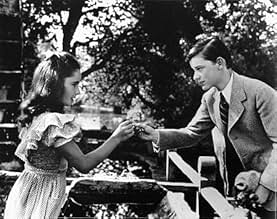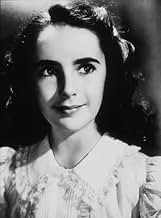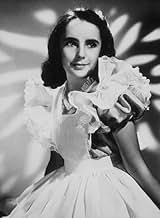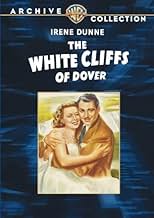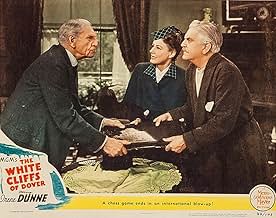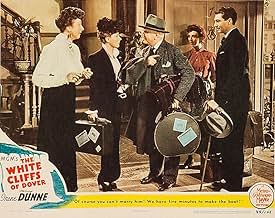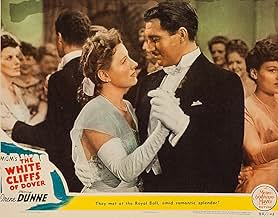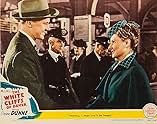AVALIAÇÃO DA IMDb
7,0/10
1,9 mil
SUA AVALIAÇÃO
Susan viaja com o pai para a Inglaterra para passar férias. Convidada para um baile, Susan conhece Sir John Ashwood e se casa com ele após um romance turbulento.Susan viaja com o pai para a Inglaterra para passar férias. Convidada para um baile, Susan conhece Sir John Ashwood e se casa com ele após um romance turbulento.Susan viaja com o pai para a Inglaterra para passar férias. Convidada para um baile, Susan conhece Sir John Ashwood e se casa com ele após um romance turbulento.
- Direção
- Roteiristas
- Artistas
- Indicado a 1 Oscar
- 3 vitórias e 1 indicação no total
May Whitty
- Nanny
- (as Dame May Whitty)
Harry Allen
- English Cabbie
- (não creditado)
Wilson Benge
- Chauffeur
- (não creditado)
Matthew Boulton
- Immigration Officer
- (não creditado)
Edmund Breon
- Major Rupert Bancroft
- (não creditado)
Clifford Brooke
- Indian Major in Boardinghouse
- (não creditado)
Avaliações em destaque
The only reference to the White Cliffs of Dover comes in at the beginning of the film as we watch Susan and her friend, Sam Bennet, as they are approaching England by sea. The magnificent cliffs are seen in the distance in all their splendor. Susan, clearly moved by the sight, revels on the many things that await her in London where she and her father are going to spend two weeks vacation.
Alas, when they arrive, they are treated to the typical rainy weather, that puts a damp, no pun intended, in her enjoyment of a city and all things English she has always admired. Instead of finding a place that meets all her expectations, Susan has to endure the weather and the prospect of going back without seeing the sights and places she really wanted to see.
Enter the kind Colonel, the man living in the modest hotel where the Dunns are staying. He invites Susan to a society ball where she meets Sir John Ashwood, the man who will become her husband. John is instrumental in her staying in England. Susan never expected to be married into the rich gentry that John belongs to. In fact, the beginning of her life in the family country estate convinces her she doesn't belong.
It's 1915 and WWI arrives without warning. Susan sees in horror how John goes to his regiment and to the front. He eventually dies, but the son that arrives for her is, in a way, a painful reminder of the great loss she suffered. Like his father, the boy grows up and has to go to war, as it's expected of his kind.
"The White Cliffs of Dover" was directed by Clarence Brown, who gave it a great look. Irene Dunne makes a good impression as Susan, the courageous woman who stays in a strange country and has to make a new life for herself and her new family. Alan Marshal is perfect as the dashing John Ashwood.
In minor roles we see Roddy McDowall, who plays the young John Ashwood. Harry Morgan is Susan's father. Gladys Cooper, May Witty, Peter Lawford, Van Johnson, C. Aubrey Smith, and the rest of the cast do good work. The young Elizabeth Taylor is seen as the young Betsy and June Lockhart appears as the grown up girl in uncredited roles.
"The White Cliffs of Dover" is about loyalty for one's country and how tradition plays a role in the lives of all the people one meets in the story, even during the difficult times these characters had to live.
Alas, when they arrive, they are treated to the typical rainy weather, that puts a damp, no pun intended, in her enjoyment of a city and all things English she has always admired. Instead of finding a place that meets all her expectations, Susan has to endure the weather and the prospect of going back without seeing the sights and places she really wanted to see.
Enter the kind Colonel, the man living in the modest hotel where the Dunns are staying. He invites Susan to a society ball where she meets Sir John Ashwood, the man who will become her husband. John is instrumental in her staying in England. Susan never expected to be married into the rich gentry that John belongs to. In fact, the beginning of her life in the family country estate convinces her she doesn't belong.
It's 1915 and WWI arrives without warning. Susan sees in horror how John goes to his regiment and to the front. He eventually dies, but the son that arrives for her is, in a way, a painful reminder of the great loss she suffered. Like his father, the boy grows up and has to go to war, as it's expected of his kind.
"The White Cliffs of Dover" was directed by Clarence Brown, who gave it a great look. Irene Dunne makes a good impression as Susan, the courageous woman who stays in a strange country and has to make a new life for herself and her new family. Alan Marshal is perfect as the dashing John Ashwood.
In minor roles we see Roddy McDowall, who plays the young John Ashwood. Harry Morgan is Susan's father. Gladys Cooper, May Witty, Peter Lawford, Van Johnson, C. Aubrey Smith, and the rest of the cast do good work. The young Elizabeth Taylor is seen as the young Betsy and June Lockhart appears as the grown up girl in uncredited roles.
"The White Cliffs of Dover" is about loyalty for one's country and how tradition plays a role in the lives of all the people one meets in the story, even during the difficult times these characters had to live.
This movie telecast recently on TCM was one of many made to promote better relations between the ordinary people of Britain and the USA. Michael Korda claims in his book that his father, Sir Alexander Korda was sent to Hollywood by Churchill, before the USA entered the war, with a mission to persuade his movie mogul friends to make movies with pro British themes. By the time this movie was released,there was a large build up of US service personnel in the UK in preparation for invasion of Europe and resentment towards the GI's was not uncommon. For many of todays viewers it may seem to be a little over the top. Howerver it is a classic, if for the only reason, it was our first glimpse of the fabulous Liz Taylor.
One of the great crimes of the Academy of Motion Picture Arts and Sciences is that Dunne was never given an Oscar....not even an honorary one! Most of her performances transcend time and come off as fresh and natural today as when they were first delivered. She just must have made it look too easy. The woman could do everything! At any rate, this film features another strong performance from her. She plays a young American girl who comes to England with her father (the irascible Morgan) and is soon swept off her feet by dashing and wealthy Marshall. Before they can enjoy any sort of life together, he is called to serve in WWI and they are separated. This is only part of the story as her life unfolds through the next decades and she struggles with letting her son (McDowall, then Lawford) serve in WWII. The film is obviously patriotic and propaganda filled, but understandably so as WWII was still being waged! Dunne is luminescent in the role and is surrounded by a strong array of familiar supporting actors. Notable are Cooper (endlessly watchable in anything!) and Witty (wonderfully crotchety, yet sentimental.) It is a touch jarring to see Taylor grow into Lockhart (young Taylor barely says anything, but "Yes, Sir John".) Lawford is at his most youthful and appealing. The film has a lot of sentiment and melodrama, but also a lot of heart and a little humor. It winds up being quite touching at times and displays a time long gone, but a patriotism that can still be resurrected when events call for it.
10kip_9
This film is both tender and powerful-with a very moving score. If, like me, you enjoy lying down at night just listening to the voices and music coming from an old classic film-this is the one for you. At the beginning when Ms. Dunne is telling her story and reflecting on her life in England-the music fits perfectly, the mood is wonderful, and her voice just makes you want to melt. Then, before you know it, even though you thought you just might want to "half" watch this film on a lazy night-you find yourself caught up in it all. The English/American bickering becomes quite funny, the romance, the war, the drama, the sadness, the next war... Irene Dunne at her best-and beautiful as ever-with that strange, knowing almost mischievous look in her eyes. I truly believe that films like these are healthy for us(sort of like watching fish in an aquarium-or shopping for antiques, petting a dog, etc.) Do yourself a favor and watch/listen to this lovely movie. If you're an Anglophile then you are really denying yourself a great pleasure by not seeing it.
It is almost Christmas 2002, a difficult year for Americans and a perfect time for World War II nostalgia. I was 16 years old when this moviecame out, I am 76 now and "Cliffs" is as fresh today as it was then. The songs, English and American are marvelous, and Irene Dunne shines. Supporting cast is typical of the wonderful character actors of the time plus Elizabeth Taylor. We are moved by an American woman (Dunne) who loses a husband in World War I and a son in World War II. Frank Morgan, who is always Frank Morgan even in the "Wizard of Oz" is marvelous as Dunne's Father. Dame Mae Whittey, Gladys Cooper, Allain Marshall, C. Aubrey Smith as the very British Colonel -- everyone adds to the beauty of this movie, and we must not forget that Irene Dunne is the narrator of the famous poem of World War II, "The White Cliffs of Dover" which is still available in bookstores. I would put this movie in well-done Black and White, right up there with "Thirty Seconds Over Tokyo" (Van Johnson has a bit part in "Cliffs"), "Mrs. Miniver" with Greer Garson, and the magnificent World War 2 Series, "War and Remembrance" and "Winds of War". I am amazed that "black and white" is still effective. I hope this movie is presented as often as "It's a Wonderful Life" every year in the future.
Você sabia?
- CuriosidadesIrene Dunne reads a telegram from her Anglophobe father to a group of English people. Her father begs her not to marry an Englishman she is in love with and tells her "You're a Yankee through and through! Think of Paul Revere! Think of the Old North steeple! Remember the Alabama!" The viewer may become confused at this point. "Remember the Alabama"? Shouldn't it be "Remember the Alamo"? However, since the context of the telegram is anti-British any mention of the Alamo would be irrelevant. What Irene Dunne's father is apparently taking about is the C.S.S. Alabama, one of several Confederate warships that were built in British shipyards over United States protest during the Civil War. These ships attacked U.S. shipping in the Atlantic Ocean. Since Irene Dunne arrives in England in April of 1914 and married just before August 4, 1914 when Great Britain declared war on Germany, the telegram was probably sent close to the 50th anniversary of the sinking of the Alabama by the U.S.S. Kearsarge on June 19, 1864 in the English Channel. The United States sued Great Britain in 1869 over the building of the Confederate warships and was awarded $15.5 million.
- Erros de gravaçãoA gift with a plaque dedicated to First Lady, Dolley Madison, misspells her name "Dolly Madison."
- Citações
Susan Dunn's landlady: [Of Susan]
Susan Dunn's landlady: Such a nice young thing! Not a bit like an American.
- Versões alternativasElizabeth Taylor's scenes are often deleted in older TV prints.
- ConexõesFeatured in Twenty Years After (1944)
- Trilhas sonorasAuld Lang Syne
(1788) (uncredited)
Traditional Scottish 17th century music
Lyrics by Robert Burns
Played during the opening credits and often in the score
Principais escolhas
Faça login para avaliar e ver a lista de recomendações personalizadas
Detalhes
- Data de lançamento
- País de origem
- Idiomas
- Também conhecido como
- Evocación
- Locações de filme
- Empresa de produção
- Consulte mais créditos da empresa na IMDbPro
- Tempo de duração2 horas 6 minutos
- Cor
- Proporção
- 1.37 : 1
Contribua para esta página
Sugerir uma alteração ou adicionar conteúdo ausente



